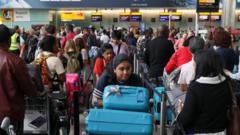What Caused the Air Traffic Control Failure That Airlines Are Demanding Answers For?

Understanding the Recent Air Traffic Control Outage in the UK
The recent air traffic control outage in the UK has raised significant concerns among airlines, passengers, and government officials alike. The incident, which occurred as flights were grounded across the country, showcased vulnerabilities within the air traffic management system operated by NATS (National Air Traffic Services). This article delves into the details of the outage, its implications, and the responses from various stakeholders, ultimately shedding light on the importance of robust air traffic management systems in ensuring smooth travel.
The Incident: What Happened?
On a busy travel day, NATS experienced a system outage that resulted in chaos at airports across the UK. More than 150 flights were cancelled, and thousands more were grounded as air traffic control struggled to manage the situation. NATS reported that the problem was "radar-related" and had taken approximately 20 minutes to resolve by switching to a backup system. Despite this swift response, the fallout from the outage left countless passengers frustrated and stranded.
The Impact on Airlines and Passengers
The ramifications of the outage were felt across multiple airlines, with EasyJet and Ryanair being the most vocal in expressing their dissatisfaction. EasyJet's chief operating officer described the incident as "extremely disappointing," particularly during a peak travel season. Ryanair executives echoed this sentiment, with one official calling for the resignation of NATS chief executive Martin Rolfe, citing mismanagement and a failure to learn from previous incidents.
Passengers, too, faced significant disruptions. Many travelers found themselves stranded, with some missing important events, such as weddings or sporting competitions. Stories of frustration and disappointment emerged, highlighting the human impact of the outage. The chaos led to not only cancellations but also diversions of flights to European airports, further complicating travel plans for many.
Government Response and Accountability
The UK government has stated that it is "working closely" with NATS to investigate the cause of the outage. This collaborative effort underscores the importance of transparency and accountability in the aviation sector. In light of the repeated failures, there is growing pressure on leaders within NATS to ensure that adequate measures are implemented to prevent future incidents.
Neal McMahon, a Ryanair executive, has been particularly vocal, criticizing the management of NATS and calling for significant changes to improve air traffic control operations. His comments reflect a broader sentiment among airline executives who are increasingly frustrated with the reliability of air traffic services. The insistence on learning from past mistakes is echoed in the calls for reform and improvement.
The Technical Side: What Went Wrong?
Understanding the technical aspects of the outage is essential for grasping its severity. NATS described the issue as being related to radar systems, which are critical for tracking aircraft and managing airspace. The failure of such a vital system raises questions about the resilience and redundancy built into air traffic control infrastructure.
The fact that NATS was able to switch to a backup system within 20 minutes is commendable, but it also highlights the need for a more robust primary system. An investigation into the exact nature of the radar issue will be crucial in determining whether it was a one-off incident or indicative of deeper systemic problems.
Lessons from Past Incidents
This isn't the first time air traffic control issues have caused widespread disruptions in the UK. An earlier incident in August 2023 saw over 700,000 passengers affected by a major outage that resulted in the cancellation of more than 500 flights. These repeated failures underscore the need for a comprehensive review of air traffic management systems and protocols.
Airlines and passengers alike are eager to understand what steps will be taken to address the underlying issues and prevent similar incidents in the future. This includes not only technical upgrades but also training and operational changes within NATS to enhance their response capabilities during emergencies.
The Economic Impact
The economic implications of such outages can be substantial. Airlines face financial losses due to cancellations and delayed flights, while passengers often incur additional costs, such as accommodation and meal expenses. The ripple effects extend beyond individual airlines, impacting the broader travel and hospitality sectors, as well as local economies reliant on tourism.
According to flight data firm Cirium, the recent outage accounted for approximately 3% of all UK flight departures and 2% of arrivals, demonstrating the scale of disruption. When cancellations occur, not only do airlines lose revenue, but their reputations can also suffer, potentially affecting future bookings and customer loyalty.
Building Resilience in Air Traffic Management
In light of these challenges, it is crucial for air traffic control systems to build resilience. This involves investing in technology, training, and processes that can withstand unexpected failures without causing widespread disruption. Some potential strategies include:
- Upgrading radar and communication systems to ensure reliability.
- Implementing comprehensive training programs for air traffic controllers to handle emergencies effectively.
- Developing contingency plans that can be activated swiftly in the event of system failures.
- Enhancing collaboration between airlines and air traffic control providers to streamline communication during crises.
By focusing on these areas, the aviation industry can work towards minimizing the impact of future outages and ensuring a smoother travel experience for passengers.
Passenger Rights and Compensation
A critical aspect of airline disruptions is the rights of passengers. Under EU regulations, passengers affected by flight cancellations may be entitled to compensation, depending on the circumstances surrounding the disruption. In cases of technical failures, such as the recent NATS outage, airlines may argue that they were not at fault, which can complicate the compensation process.
Passengers should be aware of their rights and the procedures for claiming compensation. Key points include:
- Passengers are entitled to compensation if the airline is at fault for the cancellation.
- Compensation may vary based on the distance of the flight and the length of the delay.
- It is essential to keep receipts and documentation related to incurred expenses during travel disruptions.
As the industry evolves, it is vital for both airlines and passengers to remain informed about their rights and responsibilities in the event of disruptions.
Future Outlook for Air Travel in the UK
The recent air traffic control outage has prompted a serious examination of the UK’s air traffic management systems and their capacity to handle increasing flight volumes. As travel demand continues to rise, especially during peak seasons, ensuring the reliability and resilience of air traffic services will be paramount.
Stakeholders, including airlines, government officials, and air traffic control providers, must collaborate to implement the necessary improvements. This will not only enhance safety but also restore confidence among travelers who rely on air travel for both leisure and business purposes.
Conclusion: A Call for Action
The recent air traffic control outage serves as a stark reminder of the vulnerabilities within the aviation system. The coordinated response from airlines, government officials, and NATS is critical in addressing these issues and rebuilding public trust. As we move forward, it is essential to prioritize improvements in air traffic management to ensure a seamless travel experience for passengers.
What measures do you believe should be taken to enhance the resilience of air traffic management systems? The future of air travel depends on our ability to learn from past incidents and implement effective solutions. #AirTrafficControl #TravelDisruption #AviationSafety
FAQs
What caused the recent air traffic control outage in the UK?
The outage was described as "radar-related" and resulted in significant flight cancellations and delays across the UK.
How did NATS respond to the outage?
NATS switched to a backup system within 20 minutes to resolve the issue and apologized for the disruptions caused.
What impact did the outage have on airlines and passengers?
Over 150 flights were cancelled, and thousands of passengers faced delays or missed connections, leading to frustration and inconvenience.
Are passengers entitled to compensation for disruptions?
Yes, under certain conditions, passengers may be entitled to compensation for flight cancellations, although this can be complicated by the nature of the incident.
What steps can be taken to improve air traffic management systems in the future?
Investing in technology, enhancing training programs, and developing robust contingency plans are essential for building resilience in air traffic management.
Published: 2025-07-31 02:35:11 | Category: technology



